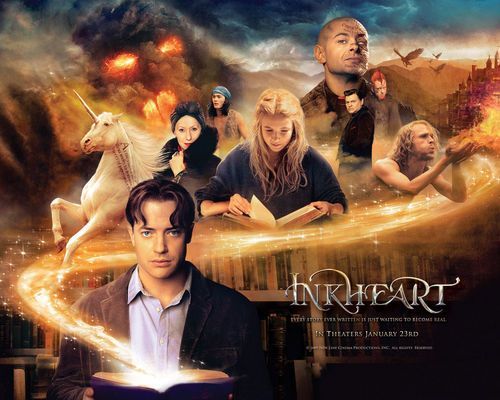Here is where Cornelia Funke differs from most authors. In some ways, I think she realizes that a happy ending isn't necessarily the wisest route. There can be goodness that occurs out of tragedy, but it doesn't make the tragedy any less poignant for the reader. When Dustfinger breathes his last at the conclusion of "Inkspell" there is the immediate loss felt by the reader. I also experienced a hope that it wasn't really his end and that Cornelia would find a way to draw him back from a darkness he did not deserve.
The entire premise of Inkheart is redemption.
Anyone who has read the books knows that Dustfinger began his journey in a pathetic strain, being almost cowardly in his actions and assistance of Capricorn. He was afraid and yielded to peer pressure even when he knew it was wrong. How often do I do the same thing? I chuckle uneasily with groups of people, indulging their crude humor or political agenda, when inside I know I'm only yielding to peer pressure and doing absolutely no good. In a way, I am Dustfinger. Since I can see these flaws in myself, than it means I also potentially see Dustfinger's future strengths in myself. Wow, what a concept!
Dustfinger is a pathetic coward for at least 1000 pages of his story. Until he is suddenly reborn into a new creation.
Cornelia hasn't made any claims toward Christianity that I am aware of, but the overtone is there just the same. Fire purified him, breathing new life into his nostrils, and he became new. No longer was Dustfinger afraid of evil, he had found a new power in something greater than himself. He was changed, washed clean. I'm awed even as I remember how beautiful Inkdeath's symbolism is, how much it touched me. Cornelia opened a whole new realm of possibility, taking a page out of C.S. Lewis' writing style, even if she was unaware of his influence upon her story.
Different books speak to different people. I found salvation and redemption in the story of Inkheart. The other characters are important, from Mo to Elinor, but this is really Dustfinger's story. It is through him that we see man's capacity to do a complete about-face from cowardice and sin. And it is through him that I am reminded of the beauty I experience in my own salvation and how, through the shed blood of Jesus, I should not be afraid.
Someday, like Dustfinger, I hope to achieve that level of peace and security in my walk with the Lord. When it comes to faith, I seek The Bible and when it comes to imagination, I seek Inkheart!


A fascinating assessment of a book I have yet to fully read and enjoy. But I found the movie quite remarkable in its sweetness and yes, in many ways, it does seem to be a story about Dustfinger more than the others, about finding himself.
ReplyDeleteWould someone care to explain why this post keeps popping up to the forefront of my "popular posts" list and has the most hits?
ReplyDeleteThis is my oldest post, guys! Lots of stuff has been said since this point. :-)